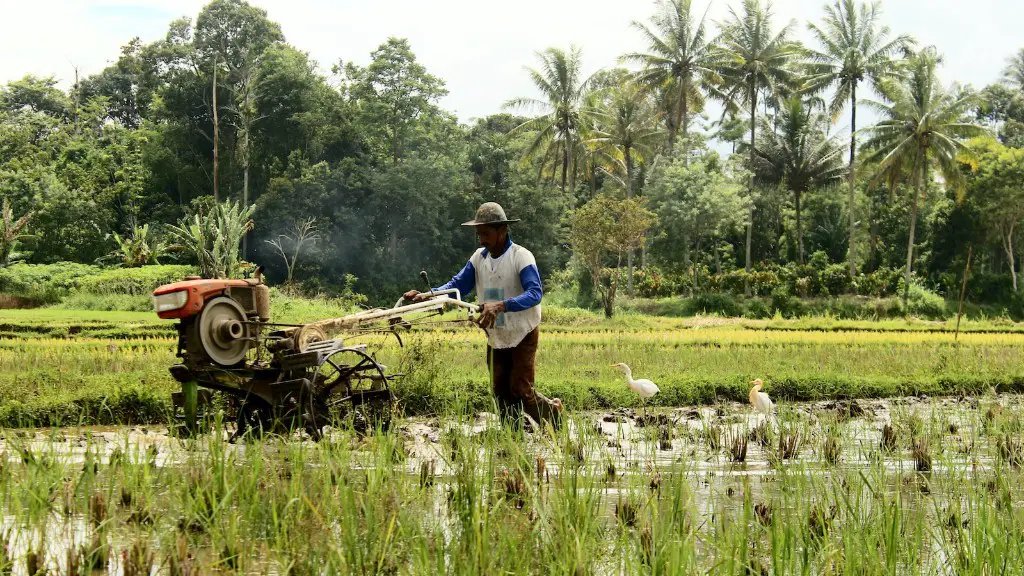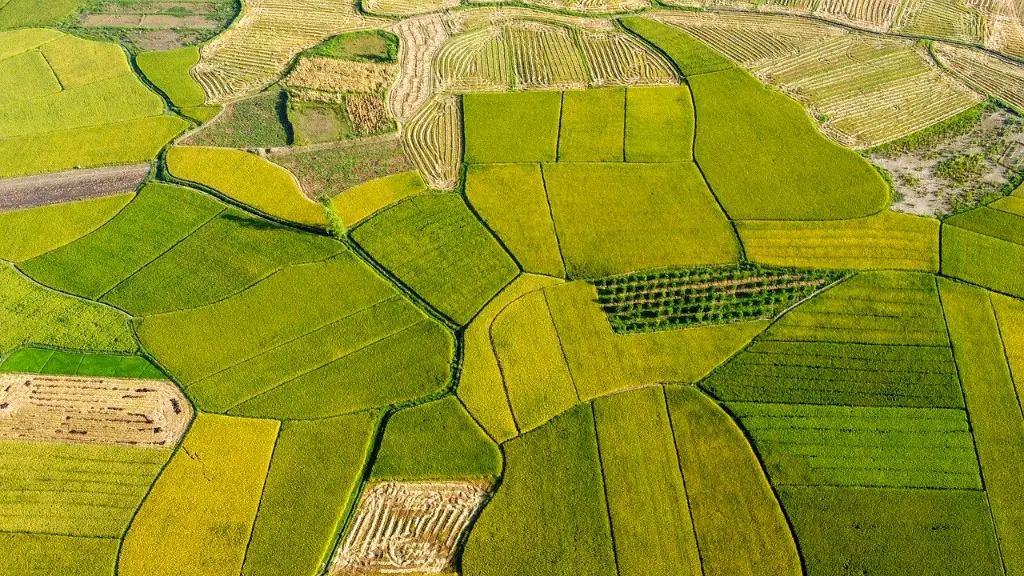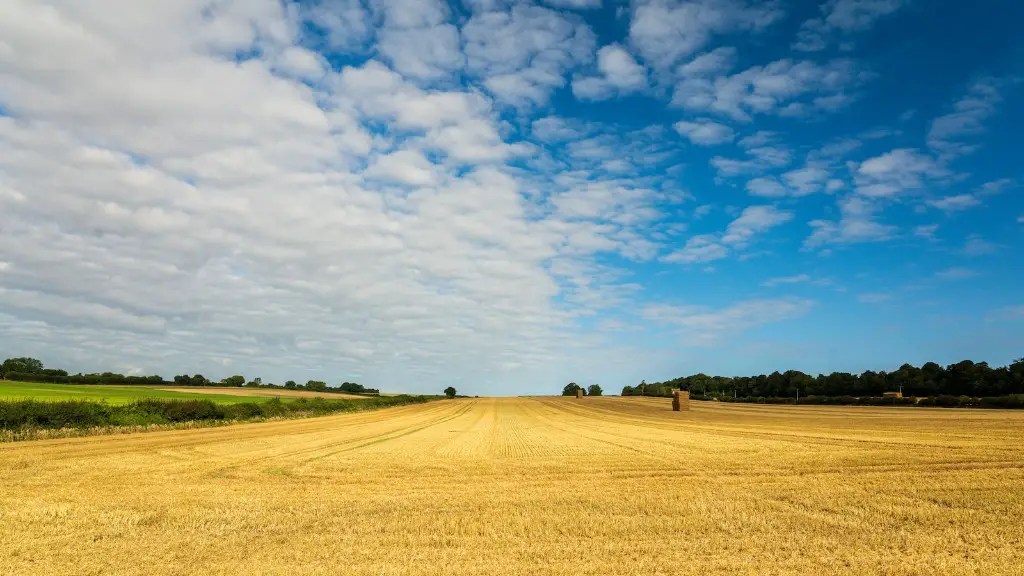Employment opportunities in the agricultural sector can be numerous, ranging from working farms and ranches to agricultural research and policy analysis. Agricultural workers play an essential role in producing the food that feeds the world. As such, farming and working with animals are prominent fields for employment. Jobs may also arise for consultants and advisors, or to work in the trade, processing, or distribution of agricultural products.
Many opportunities for employment in agriculture exist for people who have a background in animal or plant sciences, or engineering. Working with agribusinesses, the government, and educational institutions, agricultural workers can help to improve food production and sustainability. Employment opportunities can range from lab technicians and field workers to industry experts and specialised consultants.
One potential job opportunity is as a farmer or rancher, who plans and conducts farming operations, such as crop cultivation, animal husbandry, and soil management. A farmer or rancher, who owns the land and buildings, the tractors and other equipment, the livestock, and the other elements associated with agricultural production, would need to make decisions on when to plant, harvest, and market their crops or livestock.
Agronomists work with farmers, agriculture businesses, and governments, to address issues of soil fertility and fertiliser use, as well as making recommendations for reducing environmental impact and promoting sustainable agriculture. In addition to this, plant pathologists and entomologists may be employed to experiment on and develop new and better ways of growing food products. Other specialised agricultural positions may include food processors and food technologists, who track trends in the industry and analyse consumer requirements.
Much of the science of agricultural is branching away from traditional farming methods, and is branching into biomimicry, which involves mimicking biological systems for better “living” or “working” conditions. As such, agricultural scientists and engineers have opportunities in applying their expertise in robotics and electronics, as well as in biochemistry and food science. For example, agronomists may provide advice on alternative crop rotations, while engineers may develop new methods of harvesting or machines that help to make farming more efficient.
Agribusiness
Agribusiness is the business of producing, marketing, and/or distributing agricultural products and services. Agribusinesses employ workers for marketing, product development, oversight of supply chains, management of commodities, sales, and public relations. To work in agribusiness requires knowledge of the agricultural industry, the sector’s markets and customers, the dynamics of product pricing, and the logistics of distribution. Skills critical to success in agribusiness include financial management, market analysis and sales, and interpersonal relations.
Some agribusinesses specialise in providing business services, such as financial management, credit and accounting, human resource management, and legal services. Others focus on marketing, such as promotional plans, product research, and customer service initiatives. Additionally, agribusinesses may offer services to farmers and ranchers, such as providing weather forecasts and soil analysis, crop planning and recommendations for pest control.
Agribusinesses also provide a range of services related to the production of raw agricultural materials, such as risk management and development of new technologies, including automation and precision agriculture. They are also essential in the distribution of agricultural inputs and products, whether for domestic or global markets. Finally, agribusinesses may operate as research organizations, where scientists, experts, and analysts study the production and economics of various agricultural crops.
Agribusiness is a rapidly growing field, with numerous employment possibilities. The key to success in this field is an understanding of the needs and operations of agribusinesses, their dynamics, their economics, and the global agricultural market.
Agricultural Policy
Agricultural policy encompasses both the broad strategies and measures implemented by governments, and the concepts and approaches used in formulating such policies. Typically, agricultural policies are driven by the objectives of agricultural development: increasing production, stability of production, and improving the lives of farmers and general citizens. Policies within this area can also address issues such as agriculture dependence on fossil fuels, agricultural production and the environment, animal welfare, genetic engineering, food safety, food security, subsidies, and agricultural taxes.
In the public policy arena, there are those who work developing and defending the interests of agricultural groups in issues such as forestry and range management, animal health and welfare, food safety and security, government regulatory oversight, production costs and marketing. There are also roles for those who assess economic and environmental impacts of agricultural policy decisions, provide policy analysis and advice to governing bodies, and research and document agricultural, economic and environmental issues.
In addition to policy professionals in the public sector, there are also roles for those who represent agricultural interests to governmental bodies, such as through lobbying. Agricultural consultants, advisors, and analysts can provide advice on the impact of agricultural regulations and provide support in the developing and implementing of policies. Finally, agricultural trade organizations may need the expertise of policy professionals in order to understand the implications of policy initiatives and in influencing the direction of policy.
Environmental Impacts
Though agricultural production is important to the global economy, it is also recognized as one of the major contributors to global environmental damage. This includes contributing to climate change, deforestation, soil erosion, water depletion, and air pollution—all of which can have long-term and far-reaching effects on society, the environment, and economic development.
Though there are numerous challenges, the agricultural sector can also be a source of positive environmental change. For example, agricultural practices may be employed in order to mitigate climate change, manage water resources, conserve biological diversity, reduce soil erosion and degradation, and reduce air pollution. Moreover, agricultural initiatives are increasingly finding ways to reduce their environmental impact, such as by replacing traditional inputs with biopesticides and organic fertilisers.
Environmental scientists, specializing in areas such as hydrology and air quality, are among those providing advice to the industry in order to reduce their environmental impacts. In addition, agricultural practitioners can play an important role by understanding the implications of their operations and implementing sustainable management practices. Other professionals, such as policy makers, economists, and business developers, must also take this into account when making decisions driven by profitability and efficiency.
Farm Education and Training
Agricultural training programs are available to both entry-level and experienced agricultural professionals. These programs range from instructing the basics to advanced coursework in crop management, livestock husbandry, and agro-business principles. Whether one is looking to brush up on their skills or to make a career shift, agricultural training is available to enable individuals to pursue opportunities in this field. In addition to classroom studies and lectures, it may be necessary to gain practical experience in the form of internships or volunteering.
In addition to helping students understand the concepts of agronomy, animal science, and business, these programs provide direct experience in the design and management of an agricultural operation. This may include hands-on learning in the fields and barns, as well as roundtable discussions and field trips to local farms. Often, trainees will gain access to the latest farming equipment and research.
In addition to traditional classroom instruction, there are programs open to individuals wishing to receive instruction in the specialized areas of food production, natural resources, outdoor recreation and land management, and related areas. Certification in these areas may require prerequisite coursework, practical experience, or exams. Also, agriculture-related subjects are available to work in fields such as plant and crop science, soil science, and agricultural economics.
Organic Farming
Organic farming is the practice of cultivating crops, managing soil fertility, and raising livestock without the use of synthetic fertilisers, pesticides, or drugs. Organic farming is gaining in popularity, especially in light of the growing concerns about the effects of conventional crop production methods on the environment, human health, and animal welfare. As a result, organic farming is becoming an increasingly important part of the agricultural sector.
Organic agriculture presents unique employment opportunities. In addition to the skilled labour required to run a farm, such as farmers and farmhands, there can be many other roles and responsibilities, such as obtaining and maintaining certifications, marketing and quality assurance, soil science, and research. Those with an understanding of environmental science, and the ability to navigate government regulations related to organic practices, can also be invaluable resources for an organic farm operation.
Organic farmers need a dedicated team of professionals to help their operations thrive. This might include a financial manager, a marketing specialist, and quality assurance staff, as well as a group of experts who specialize in organic methods, such as crop rotation, pest control, soil fertility and livestock management. Organic farming also requires knowledgeable and skilled personnel who can train newcomers and advise on the use of organic materials, growing practices, and sustainability initiatives.
Conclusion
The modern agricultural sector holds a wealth of employment opportunities for those wishing to work in the agribusiness industries, in agricultural policy and environment, and in organic and farm education and training. By understanding the needs of the agricultural sector and its customers, and the global agricultural markets, individuals can find success and bring positive change to the industry.





